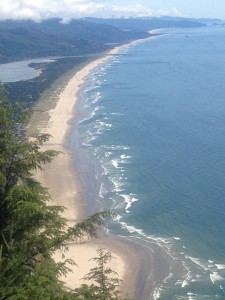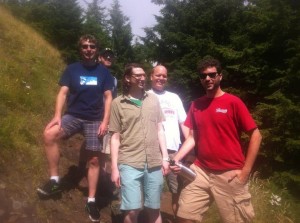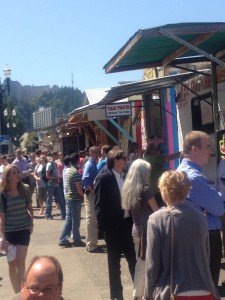 1. Listening to poetry in Middle English is pure pleasure, though I’m a bit shy about performing it in public myself. Enjoying the slightly-different syllables as they wash over you is a particular joy of the culture of medieval studies.
1. Listening to poetry in Middle English is pure pleasure, though I’m a bit shy about performing it in public myself. Enjoying the slightly-different syllables as they wash over you is a particular joy of the culture of medieval studies.
2. The state of eco-play in medieval criticism is vibrant, and its green owes much to the forest otherworld of romance and also of pre-Christian mythologies. Not nearly as much pastoral as on my home turf. That’s a nice reminder for me.
3. The innovation of threaded panels snaking through the conference — the two I followed most were “Oceans” and “Ecology,” but there were several others including “Neighbors” of which I wished I could have heard more — created a wonderfully connected but variable labyrinth through the days’ events. A very well-executed idea that at some point I’ll want to steal.
4. Inspired perhaps by Portland’s shockingly good micro-brews, the circum-conference festivities felt like we were Olympic swimmers plunging in for a sprint. Exhausting but exhilarating, though I confess I wasn’t really ready for the karaoke. The night before my panel I had to duck out of the bar before the apotheosis of Eileen Joy, but I have no doubt it went off as planned. Or maybe better than that.
5. Someone I don’t know at one of Thursday’s (?) panels said that the essential virtue of The Canterbury Tales was “fellowship” — or maybe I’ve garbled that slightly, but in any case I was amazed by the good fellowship on display everywhere, and the willingness to welcome an interloping early modernists into both the intellectual and festive parts of the week. As Jeffrey Cohen noted in his post-conference blog, the mood was “future-oriented, not nostalgic,” and strikingly optimistic, which I like.
6. Too many great papers to name, but I was fascinated by Anne Harris’s talk on the making of stained glass in Allan Mitchell’s “Animate Objects and Ecologies” panel and also by George Edmondson on King Horn as sea-creature in Jeffrey Cohen and Patricia Ingham’s “Oceans/Neighbors” session. Anne also wrote a lovely meditation on the conference on her Medieval meets world blog.
7. It was a pleasure to meet Geoffrey Chaucer himself, and to locate his blog, which featured in the plenary talk.
8. I had wondered what sorts of fluid bodies medieval oceans might be, and whether the relatively local, Med and Channel and North Sea confines of English voyaging would change the way literary scholars read the sea. I’m not sure; my own talk was about maritime orientation across the medieval / early modern divide, via astrolabes, lead lines, ports, and poetry. I heard some great stuff on the multilingual English Channel from Jonathan Hsy, literal and spiritual turbulance by James Smith, and the “Man of Law’s Tale” by Ingrid Nelson. Bodies of salt water always exert disorienting pressure, whether of literally global size or not. Plus it’s all the same water, anyway, slowly circulating.
9. Portland is a great place for a conference: great beer, good food, plus poetry readings at Mother Foucault’s and of course Powell’s. I especially loved the food trucks at which we ate lunch everyday, banh mi to pad thai to assorted mexican and other places. Any time NYC wants to license food trucks, I’m ready.
10. Hearing a bunch of conference delegates read their own original poetry was a real treat. Organized by Chris Piuma, who read an elaborate connecting poem about bananas, the reading brought together a few local poets — Chris used to live in Portland and knows the local scene — with intense and heartfelt poems by Eileen Joy, Dan Reiman, and a medievalist from SUNY Buffalo named David whose last name I don’t remember but who read great walking-around poems from his days in San Francisco. Sometimes academic conferences can play too close to the vest, but original poetry has a way of bringing the real stuff out.
11. Some great swimming in Oregon, too: I only got one early-morning workout at a nice local community pool (I blame it on the beer, or perhaps the good fellowship), but an icy dip in Crater Lake on the way north plus two swims in the cold Pacific, one without and one with a wetsuit, were as cleansing as could be.
 12. Some might think that the highlight of my conference was throwing Jeffrey Cohen into the Pacific on Friday afternoon at Cannon Beach. It was memorable — plus, since I joined forces to corral Jeffrey with fellow early modernist Lowell Duckert, this event brought to a head the running Shakespeare-v-Chaucer gags that punctuated the week. (Btw: we made sure Jeffrey put his iPhone down before immersion. Really it was all very civilized, if wet.)
12. Some might think that the highlight of my conference was throwing Jeffrey Cohen into the Pacific on Friday afternoon at Cannon Beach. It was memorable — plus, since I joined forces to corral Jeffrey with fellow early modernist Lowell Duckert, this event brought to a head the running Shakespeare-v-Chaucer gags that punctuated the week. (Btw: we made sure Jeffrey put his iPhone down before immersion. Really it was all very civilized, if wet.)
I loved the whole post-NCS coastal excursion with Jeffrey, Lowell, Dan, and Marcus: nothing like making one’s academic subject personal. The Pacific is cold in Oregon — for body-surfing the next day I used a wetsuit. But Friday night with the post-NCS crowd it was perfect: cold, frothy, clear, like a perfectly lucid thought that’s too sharp to be forced into words. I’m sure Jeffrey realizes now that it was worth going in.
Will I return to this biannual Chaucerpalooza? I hope so, time and travel budgets willing. But if salt-water immersion is a necessary capstone, perhaps I should give Iceland 2014 a pass? Or is that a perfect opportunity for a maritime Beowulf panel?
It’s David Hadbawnik, Steve… thanks for the shout-out and it was great meeting you and sharing some karaoke and late drinks in the Portland–
DH
It was great to have you with us, especially at the poetry reading! That was David Hadbawnik, by the way who read the “waking around” San Francisco poems!
Thanks Steve – I’m glad you liked NCS as much as I did, and I’m sorry we didn’t meet (or if we did, it was briefly and drunkenly). Portland was the perfect place for that conference. But having spent a bit of time in Iceland, I can say that being immersed in very hot sulfurous hot springs is an experience you don’t want to miss! In any event, Early Modern interlopers in medieval conferences are always welcome as far as I’m concerned (it makes me feel less weird when I interlope in theirs!).
Thank you for this post, Steve – love the photo of the food carts (wish they were everywhere all over). I’ve shown _Free Fall_ to so many friends at this point – seeing the cliff within/beneath the sea continues to thrill…